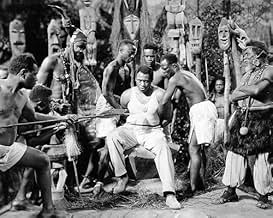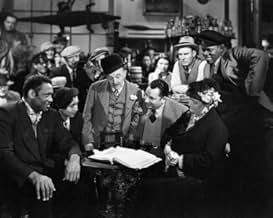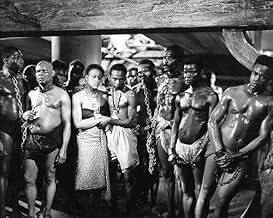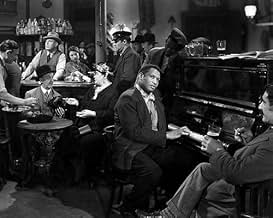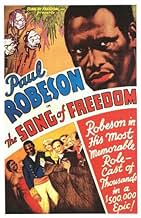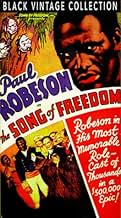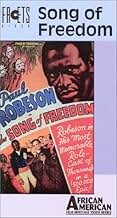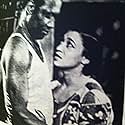AVALIAÇÃO DA IMDb
6,4/10
458
SUA AVALIAÇÃO
Adicionar um enredo no seu idiomaA black British dockworker named Johnny Zinga becomes a famous singer and learns that he is the rightful king of the African island of Casanga.A black British dockworker named Johnny Zinga becomes a famous singer and learns that he is the rightful king of the African island of Casanga.A black British dockworker named Johnny Zinga becomes a famous singer and learns that he is the rightful king of the African island of Casanga.
- Direção
- Roteiristas
- Artistas
Elisabeth Welch
- Ruth Zinga
- (as Elizabeth Welch)
Bernard Ansell
- Sir James Pyrie
- (as Bernerd Ansell)
Cornelia Smith
- Queen Zinga
- (as Miss C. Smith)
Sydney Benson
- Gate-Keeper
- (não creditado)
Cathleen Cavanagh
- Woman
- (não creditado)
Alf Goddard
- Alf, the Bartender
- (não creditado)
Avaliações em destaque
This film made Paul Robeson proud, and it also garnered high approval from leading black intellectuals at the time, such as Langston Hughes. In its first half it's very easy to see why. The story is far-fetched, but it shows black people as regular folks amongst the working-class of London, without stereotypes, and the desire on the part of one of them (Robeson) to find out where his ancestors were from. In flashing through a couple of centuries, it also showed a sample of some of the horrors of slavery, and we see a clear link to how that caused Robeson's character to be tragically disconnected from his past.
Hearing Robeson perform six songs was quite a treat, and 5-stars on its own. The second, "Sleepy River," which we see with a montage of people listening to his wonderful voice at night, is particularly stirring. Meanwhile, Elisabeth Welch is such a cutey pie as his wife, and more importantly, she's also a real person and not some mammy/servant stereotype. We even get to hear her reprise the song "Sleepy River" at the end, which was wonderful.
The film falters a bit in its second half when Robeson's character makes his way back to his ancestral island, and discovers it run by superstitious, backward people. The characterization felt troublesome, particularly since Robeson seeks to improve their life with the advances he's learned growing up in a European culture, one the film shows to be superior in every respect. On the other hand, at least it's a black man who has come to do this, and a strong, talented, intelligent black man at that. There is something moving at the heart of wanting to find your ancestral land, and to help the people living there.
I might have knocked my rating down a bit because of the problematic bits, or because the interaction Robeson has with the Africans seemed so implausible, but I kept in mind the film was made in 1936. The contrast of Robeson and Welch's characters to what was being spewed out in Hollywood at the time for African-Americans is striking, and undeniable. I enjoyed watching them here, and for the film's musical numbers and the progress it represented, was glad I saw this.
Hearing Robeson perform six songs was quite a treat, and 5-stars on its own. The second, "Sleepy River," which we see with a montage of people listening to his wonderful voice at night, is particularly stirring. Meanwhile, Elisabeth Welch is such a cutey pie as his wife, and more importantly, she's also a real person and not some mammy/servant stereotype. We even get to hear her reprise the song "Sleepy River" at the end, which was wonderful.
The film falters a bit in its second half when Robeson's character makes his way back to his ancestral island, and discovers it run by superstitious, backward people. The characterization felt troublesome, particularly since Robeson seeks to improve their life with the advances he's learned growing up in a European culture, one the film shows to be superior in every respect. On the other hand, at least it's a black man who has come to do this, and a strong, talented, intelligent black man at that. There is something moving at the heart of wanting to find your ancestral land, and to help the people living there.
I might have knocked my rating down a bit because of the problematic bits, or because the interaction Robeson has with the Africans seemed so implausible, but I kept in mind the film was made in 1936. The contrast of Robeson and Welch's characters to what was being spewed out in Hollywood at the time for African-Americans is striking, and undeniable. I enjoyed watching them here, and for the film's musical numbers and the progress it represented, was glad I saw this.
This Hammer Studio, from London, England which is famous for its horror films surprised me with this great film from 1936 starring Paul Robeson, (John Zinga) who works as a London dock worker and sings songs all the time besides having a great bass voice for the opera and is discovered by a great opera director and producer from London, England. John is always wanting to go to Africa where he came from, but he does not know exactly where he was born, but he still remembers a song which he heard when he was very young. One day John happens to sing this song on stage in an opera performance and this song is recognized by an Englishman who tells him where it comes from and also a charm which John wears around his neck which helped determine its origin. John also has a wife and they both visit this Island and try to introduce themselves to these people and that is when the story gets very interesting. Don't miss this great film from the past, it is a gem in the rough. Enjoy
Although no-one could call this a great movie, it is of compelling historical interest. At a time when Black people in the movies were servants or scoundrels, Paul Robeson portrayed a London dock-worker who is discovered by an impresario and launches a great singing career; after that, he goes to Africa to bring education and enlightenment to the tribespeople.
It's easy to be harsh on this movie; it shows the people of Africa as benighted savages in need of guidance (only this time they get it from Robeson, playing an Afro-cockney). The whole second half plays in tropical-adventure mode, with all the clichés of the 1930s.
But you have to realize that the film's sympathies are with the London dock-workers, black and white; it goes to great lengths to show them treating each other with friendship and respect, and this is the most notable part of the story. Everyone else is a caricature - the impresario, the aristocratic explorer, the witch-doctor, and so on.
Anyone who has a tolerance for 1930s films will quickly realize that this is much better than most of them, and is worth a look for many reasons, not the least is the opportunity to hear Robeson's great singing voice. One curious fact is that this is from Hammer Studios, which later became identified with horror films.
A must see for anyone interested in cinema.
It's easy to be harsh on this movie; it shows the people of Africa as benighted savages in need of guidance (only this time they get it from Robeson, playing an Afro-cockney). The whole second half plays in tropical-adventure mode, with all the clichés of the 1930s.
But you have to realize that the film's sympathies are with the London dock-workers, black and white; it goes to great lengths to show them treating each other with friendship and respect, and this is the most notable part of the story. Everyone else is a caricature - the impresario, the aristocratic explorer, the witch-doctor, and so on.
Anyone who has a tolerance for 1930s films will quickly realize that this is much better than most of them, and is worth a look for many reasons, not the least is the opportunity to hear Robeson's great singing voice. One curious fact is that this is from Hammer Studios, which later became identified with horror films.
A must see for anyone interested in cinema.
If you can possibly see The Song Of Freedom by all means do so. It's a chance to see Paul Robeson sing and give a fine acting performance in a story set partially in Africa. It's a mini-version of the famous American mini-series Roots. Paul in fact carries his roots with him both in a song that's been with him since birth and a medallion handed down to him from an ancestor who was sold into slavery and who was king of his people. That's all dealt with in a short prologue.
Fast forward to 1936 and Robeson is working on the London docks and also provides a bit of entertainment for his fellow stevedores. Impresario Esme Percy discovers him and turns Robeson into a concert/opera singer. But one night a backstage visitor tells Robeson that this melody which he has engraved in his soul is the chief's song from a particular tribe in Africa. Robeson and wife Elisabeth Welch go to that part of Africa where he attempts to reassert his royal prerogatives.
As a colonizing power in Africa, the British picked up knowledge about the place that Americans only gleaned from Edgar Rice Burroughs and other such pulp fiction authors. And in these years prior to World War II did film a lot of stories on location there such as The Four Feathers in the Sudan. Song Of Freedom was shot on location in Sierra Leone for the African part of the story. It's light years more real than anything you would get from Hollywood.
Incidentally the gambit of the 'lost song' may very well have been lifted from the Victor Herbert operetta Naughty Marietta. No matter, it's well done and provides Robeson with a number.
Elisabeth Welch who was a fine singer in her own right gets to do Sleepy Rivers. I wish she had been given more to do.
Seeing both Paul Robeson and a glimpse of the real Africa is a chance no one should pass up.
Fast forward to 1936 and Robeson is working on the London docks and also provides a bit of entertainment for his fellow stevedores. Impresario Esme Percy discovers him and turns Robeson into a concert/opera singer. But one night a backstage visitor tells Robeson that this melody which he has engraved in his soul is the chief's song from a particular tribe in Africa. Robeson and wife Elisabeth Welch go to that part of Africa where he attempts to reassert his royal prerogatives.
As a colonizing power in Africa, the British picked up knowledge about the place that Americans only gleaned from Edgar Rice Burroughs and other such pulp fiction authors. And in these years prior to World War II did film a lot of stories on location there such as The Four Feathers in the Sudan. Song Of Freedom was shot on location in Sierra Leone for the African part of the story. It's light years more real than anything you would get from Hollywood.
Incidentally the gambit of the 'lost song' may very well have been lifted from the Victor Herbert operetta Naughty Marietta. No matter, it's well done and provides Robeson with a number.
Elisabeth Welch who was a fine singer in her own right gets to do Sleepy Rivers. I wish she had been given more to do.
Seeing both Paul Robeson and a glimpse of the real Africa is a chance no one should pass up.
Greetings And Salutations, and welcome to my review of Song Of Freedom. Before we get into it, here are my ratings:
Story - 1.50 Direction - 1.25 Pace - 1.25 Acting - 1.25 Enjoyment - 1.25
TOTAL - 6.5 out of 10
Song Of Freedom surprised me by putting a smile on my face and a warmth in my heart. For a 1936 film about one African man's dream to find himself and help his people, I wasn't expecting much. Blissfully, I received so much more. The story is well written, intelligent, and finely structured. And not only does it address a couple of major issues it did so at a time other writers, directors, and producers would have steered clear of the subject matter. For one, it's the story of a black man, and Paul Robeson plays the part of John Zinga perfectly. Though it's not only this issue that's highlighted. John has a wife, Ruth, who is portrayed forcefully by Elisabeth Welch. Ruth is a powerful outspoken woman who speaks her mind. In 1936 this was pretty much unheard of, a strong female lead. And, she is a lead. Ruth, being finely constructed, works superbly alongside her husband, John. When they are on the screen together, they demand your attention. It's an ideal pairing of an actor and actress with their characters.
But my delight didn't stop there. The director does an admirable job in putting the tale onto celluloid. Even the stock shots of crowded theatres fit in the movie without drawing undue thoughts. He uses light and shade sublimely to build the tension and unease, especially in the night sequences and imprisonment scenes. But don't get me wrong, it's not perfect. As was the standard back then, whenever there was a chase scene - in Song it's on foot at the start - they speed the film up, giving the segment a Keystone Cops feel, which is terrible. However, it's only a slight thing, so it's easy to accept it and still enjoy the picture.
But, by and far, one of the most pleasurable things about Song Of Freedom is the cast. These actors and actresses are brilliant, and there are no small parts. In one scene, John has invited one of his dockworking buddies to watch his on-stage performance as he's made it as a famous singer. He's talking to him and his wife when he's interrupted by a Lord who may know the secret to the mysterious song that John keeps singing. The dockworker and his wife depart, but not before doffing his cap to the lord and giving an awkward curtsey - the look on the wife's face is outstanding. These trivial elements add depth and believability to the film.
Though I'm not a great fan of musicals, Song is not a typical musical. The music is not integrated into the telling of the story. The music is there because John Zinga is a singer. And a bloody good one at that. Though I will say, Robeson does sound better at acapella than with accompaniment. I would highly recommend Song Of Freedom to anyone who enjoys this style of drama. I thoroughly enjoyed it and will be revisiting it soon.
Please feel free to visit my Dramatisation Of Life to see where I ranked Song Of Freedom.
Take Care & Stay Well.
Story - 1.50 Direction - 1.25 Pace - 1.25 Acting - 1.25 Enjoyment - 1.25
TOTAL - 6.5 out of 10
Song Of Freedom surprised me by putting a smile on my face and a warmth in my heart. For a 1936 film about one African man's dream to find himself and help his people, I wasn't expecting much. Blissfully, I received so much more. The story is well written, intelligent, and finely structured. And not only does it address a couple of major issues it did so at a time other writers, directors, and producers would have steered clear of the subject matter. For one, it's the story of a black man, and Paul Robeson plays the part of John Zinga perfectly. Though it's not only this issue that's highlighted. John has a wife, Ruth, who is portrayed forcefully by Elisabeth Welch. Ruth is a powerful outspoken woman who speaks her mind. In 1936 this was pretty much unheard of, a strong female lead. And, she is a lead. Ruth, being finely constructed, works superbly alongside her husband, John. When they are on the screen together, they demand your attention. It's an ideal pairing of an actor and actress with their characters.
But my delight didn't stop there. The director does an admirable job in putting the tale onto celluloid. Even the stock shots of crowded theatres fit in the movie without drawing undue thoughts. He uses light and shade sublimely to build the tension and unease, especially in the night sequences and imprisonment scenes. But don't get me wrong, it's not perfect. As was the standard back then, whenever there was a chase scene - in Song it's on foot at the start - they speed the film up, giving the segment a Keystone Cops feel, which is terrible. However, it's only a slight thing, so it's easy to accept it and still enjoy the picture.
But, by and far, one of the most pleasurable things about Song Of Freedom is the cast. These actors and actresses are brilliant, and there are no small parts. In one scene, John has invited one of his dockworking buddies to watch his on-stage performance as he's made it as a famous singer. He's talking to him and his wife when he's interrupted by a Lord who may know the secret to the mysterious song that John keeps singing. The dockworker and his wife depart, but not before doffing his cap to the lord and giving an awkward curtsey - the look on the wife's face is outstanding. These trivial elements add depth and believability to the film.
Though I'm not a great fan of musicals, Song is not a typical musical. The music is not integrated into the telling of the story. The music is there because John Zinga is a singer. And a bloody good one at that. Though I will say, Robeson does sound better at acapella than with accompaniment. I would highly recommend Song Of Freedom to anyone who enjoys this style of drama. I thoroughly enjoyed it and will be revisiting it soon.
Please feel free to visit my Dramatisation Of Life to see where I ranked Song Of Freedom.
Take Care & Stay Well.
Você sabia?
- CuriosidadesPaul Robeson performs a scene from Louis Gruenberg's operatic version of "The Emperor Jones". He earlier had starred in Eugene O'Neill's original play on Broadway (1923) and in the film version O Imperador Jones (1933).
- Citações
Gabriel Donozetti: What's the matter the color of his skin, when he has color in his voice! Power! Beauty! I go fighting!
- ConexõesFeatured in That's Black Entertainment (1990)
Principais escolhas
Faça login para avaliar e ver a lista de recomendações personalizadas
Detalhes
- Data de lançamento
- País de origem
- Idiomas
- Também conhecido como
- Song of Freedom
- Locações de filme
- Empresa de produção
- Consulte mais créditos da empresa na IMDbPro
- Tempo de duração
- 1 h 20 min(80 min)
- Cor
- Proporção
- 1.37 : 1
Contribua para esta página
Sugerir uma alteração ou adicionar conteúdo ausente

